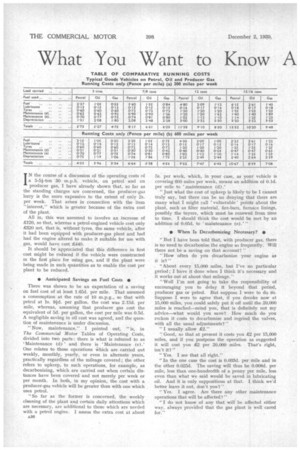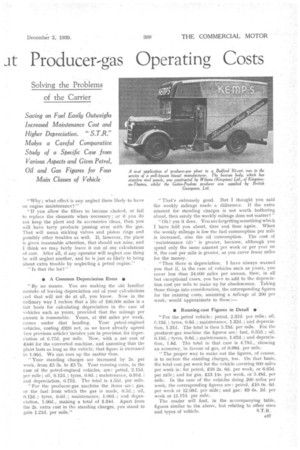What You Want to Know A
Page 38

Page 39

If you've noticed an error in this article please click here to report it so we can fix it.
it Producer-gas Operating Costs IN the course of a discussion of the operating costs of a 5-54-ton 30 m.p.h. vehicle, on petrol and on producer gas, I have already shown that, so far as the standing charges are concerned, the producer-gas lorry is the more expensive to the extent of only 2s. per week. That arises in connection with the item "interest," which is greater because of the extra cost of the plant.
All in, this was assumed to involve an increase of £120, so that, whereas a petrol-engined vehicle cost only £320 net, that is, without tyres, the same vehicle, after it had been equipped with producer-gas plant and had had the engine altered to make it suitable for use with gas, would have cost £440.
It should be appreciated that this difference in first cost might be reduced if the vehicle were constructed in the first place for using gas, and if the plant were being made in such quantities as to enable the cost per plant to be reduced.
• Anticipated. Savings on Fuel Costs •
There was shown to be an expectation of a saving on fuel cost of at least 1.05d. per mile. That assumed a consumption at the rate of 10 m.p.g., so that with petrol at 1s. 94d. per gallon. the cost was 2.15d. per mile, whereas, assuming that producer gas cost the equivalent of 5d. per gallon, the cost per mile was 0.5d. A negligible saving in oil cost was agreed, and the question of maintenance is under discussion.
"Now, maintenance," I pointed out, "is, in The Commercial Motor Tables of Operating Costs, divided into two parts: there is what is referred to as 'Maintenance (d) ' and there is 'Maintenance (e).' One relates to those operations Which are carried out weekly, monthly, yearly, or even in alternate years, practically regardless of the mileage covered; the other refers to upkeep, to such operations, for example, as decarbonizing, which are carried out when certain distances have been covered and not merely per week or per month. In both, in my opinion, the cost with a producer-gas vehicle will be greater than with one which uses petrol.
"So far as the former is concerned, the weekly cleaning of the plant and certain daily attentions which are necessary, are additional to those which are needed with a petrol engine. I assess the extra cost at about A36 5s. per week, which, in your case, as your vehicle is covering 600 miles per week, means an addition of 0.1d. per mile to 'maintenance (d).'
"Just what the cost of upkeep is likely to be I cannot truly say, but there can be no denying that there are many what I might call ' vulnerable ' points about the plant, such as filter material, fire-bars, furnace linings, possibly the tuyere, which must be renewed from time to time. I should think the cost would be met by an addition of 0.05d. to 'maintenance (e).'"
• When Is Decarbonizing Necessary? •
"But I have been told that, with producer gas, there is no need to decarbonize the engine so frequently. Will there not be a saving on that account?"
"How often do you decarbonize your engine as itis?'' "About every 15,000 miles, but I've no particular period; I have it done when I think it's necessary and it works out at about that mileage."
"Well I'm not going to take the responsibility of encouraging you to delay it beyond that period, producer gas or petrol. But suppose I were to do so. Suppose I were to agree that, if you decoke now at 15,000 miles, you could safely put it off until the 20,000 miles is reached—mind you, that is definitely not my advice—what would you save? How much do you reckon it costs to decarbonize and regrind the valves, with all the usual adjustments?"
" I usually allow £2."
" Good, so that at present it costs you £2 per 15,000 miles, and if you postpone the operation as suggested it will cost you £2 per 20,000 miles. That's right, isn't it? "
"Yes. I see that all right."
"In the one case the cost is 0.033d. per mile and in the other 0.025d. The saving will thus be 0.008d. per mile, less than one-hundredth of a penny per mile, less even than what we said would be saved in lubricating oil. And it is only suppositious at that. I think we'd better leave it out, don't you?"
"Yes. I agree. Are there any other maintenance operations that will be affected?"
"I do not know of any that will be affected either way, always provided that the gas plant is well cared for." "Why ; what effect is any neglect there likely to have on engine maintenance?"
"If you allow the filters to become choked, or fail to replace the elements when necessary; or if you do not keep the plant and its accessories clean, then you will have tarry products passing over with the gas. That will mean sticking valves and piston rings and possibly other troubles as well. If, however, the plant is given reasonable attention, that should not arise, and 1 think we may fairly leave it out of our calculations of cost. After all, if any operator will neglect one thing he will neglect another, and he is just as likely to bring about extra trouble by neglecting a petrol engine."
"Is that the lot?"
• A Common Depreciation Error •
"By no means. You are making the old familiar mistake of leaving ,depreciation out of your calculations .7.71d that will not do at all, you know. Now in the ordinary way I reckon that a life of 100,000 miles is a fair basis for calculating depreciation in the case of vehicles such as yours, provided that the mileage per annum is reasonable. Yours, at 600 miles per week, comes under that heading. Your petrol-engined vehicles, costing £320 net, as we have already agreed (see previous article) 'involve vou in provision for depreciation of 0.77d. per mile. Now, with a net cost of £440 for the converted machine, and assuming that the plant lasts as long as the vehicle, that figure is increased to 1.06d. We can sum up the matter thus.
" Your standing charges are increased by 2s. per week, from £5 5s. to £5 7s. Your running costs, in the case of the petrol-engined vehicles, are : petrol, 2.15d. per mile: oil, 0.12d.; tyres, 0.6d. ; maintenance, 0.91d. ; and depreciation, 0.77d. The total is 4.55d. per mile.
"For the producer-gas machine the items are; gas, or the fuel from which the gas is made, 0.5d.; oil, 0.12d.; tyres, 0.6d.; maintenance, 1.06d.; and depreciation, 1.06d., making a total of 3.34d. Apart from the 2s. extra cost in the standing charges, you stand to gain 1.21d. per mile." "That's extremely good. But I thought you said the weekly mileage made a difference. If the extra amount for standing charges is not worth bothering about, then surely the weekly mileage does not matter?"
"Oh! yes it does. You are forgetting something which I have told you about, time and time again. When the weekly mileage is low the fuel consumption per mile is increased, also the oil consumption. The cost of 'maintenance (d) ' is greater, because, although you spend only the same amount per week or per year on it, the cost per mile is greater, as you cover fewer miles for the money.• "Then there is depreciation. I have always warned you that if, in the case of vehicles such as yours, you cover less than 24.000 miles per annum, then, in all but exceptional cases, you have to add to the depreciation cost per mile to make up for obsolescence. Taking those things into consideration, the corresponding figures for the running costs, assuming a mileage of 200 per week, would approximate to these :— • Running-cost Figures in Detail • "For the petrol vehicle: petrol, 2.37d. per mile; oil, 0.13d.; tyres, 0.6d.; maintenance, 1.32d. ; and depreciation, 1.31d. The total is then 5.73d. per mile. For the producer-gas machine the figures are fuel, 0.55d.; oil, 0.13d.; tyres, 0.6d.; maintenance, 1.67d.; and depreciation, 1.8d. The total in that case is 4.75d., showing an economy, in favour of gas, of 0.98d. per mile.
"The proper way to make out the figures, of course, is to reckon the standing charges, too. On that basis, the total cost per week for the vehicle covering 600 miles per week is: for petrol, £.16 2s. 6d. per week, or 6.65d. per mile ; and for gas, En 14s. per week, or 5.48d, per mile. In the case of the vehicles doing 200 miles per week, the corresponding figures are : petrol, £10 Os. 6d. per week or 12.03d. per mile ; and gas : £9 Gs. 2d. per week or 11.17d. per mile.
The reader will find, in the accompanying table, figures similar to the above, but relating to other sizes
and types of vehicle. S.T.R.




































































